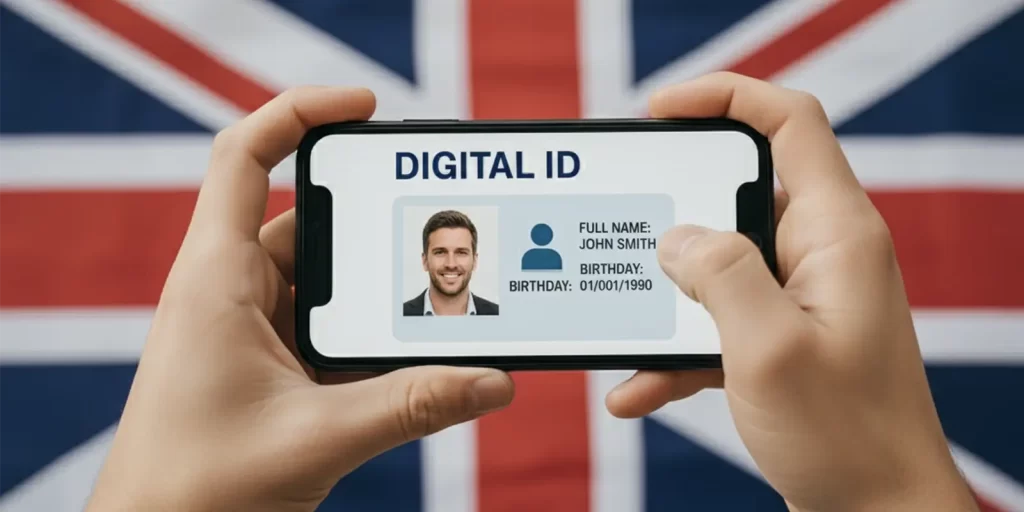The United Kingdom is diving back into a debate that never fails to stir emotions: national identity cards.
Prime Minister Keir Starmer recently announced that every worker in the UK will be required to have a digital ID, as part of his plan to curb undocumented immigration and modernize government services. But the idea has quickly become one of the most divisive topics in British politics, with critics warning about privacy risks, surveillance, and government overreach.
What Are Digital IDs — and What Would They Do?
The proposal is for a free “Brit Card”, a digital identity that every UK citizen or legal resident would keep on their smartphone.
This ID would live inside a government app called the “gov.uk Wallet” and contain key personal details: your name, date of birth, nationality, photo, and immigration status.
With it, you could prove your right to work, open a bank account, or access public services — all without needing to dig up your passport or driver’s license.
The goal, according to the government, is to make life easier by reducing paperwork, speeding up applications, and cutting down on identity fraud.
Starmer also argues that digital IDs would make it harder for people without legal status to work in the country — something he says is crucial for border control and public confidence.
“This will make it tougher to work illegally in the UK, and our borders will be more secure,” he said.
The Government’s Argument: Modernization and Control

For Starmer’s Labour government, digital IDs are not just about immigration — they’re about bringing Britain into the digital age.
Compared with European neighbors like France, Germany, or Spain, where national identity cards are the norm, the UK has long stood out for resisting them.
According to the official government website, a single digital ID would make it faster and easier to use public services, vote in elections, and even manage taxes or benefits.
Supporters also point out that 93% of British adults own a smartphone, while about 10% have never had a passport. So, in theory, a digital ID could make official identification more inclusive, not less.
So Why Is It So Controversial?
At first glance, it sounds practical. But the plan has triggered an uproar — and for several reasons.
1. Privacy and Surveillance Fears
The biggest concern is privacy.
Civil liberties groups like Big Brother Watch warn that giving the state a centralized database of citizens’ personal information could easily become a tool for mass surveillance.
Even if the government promises not to misuse the data, critics fear that future administrations might.
As Tony Travers, a professor at the London School of Economics, explained:
“There’s a deep cultural and political opposition to ID cards in the UK. Many people see them as one short step away from authoritarianism.”
And it’s not a fringe concern: over 1.6 million people have already signed an official petition to stop the plan.
2. Cybersecurity Risks
Then there’s the issue of security.
Keeping all your personal data in one digital place might sound convenient — but for many experts, it’s “a hacker’s dream.”
If the app or its servers were ever breached, millions of citizens could have their information exposed. And Britain’s history with big government tech projects hasn’t exactly inspired confidence — data leaks and IT failures have been all too common.
3. Excluding the Technologically Disconnected
Another major concern is what happens to people who don’t use smartphones.
Some choose not to own one for health, financial, or personal reasons. Others simply can’t afford it. Critics warn that digital IDs could further marginalize vulnerable groups, especially the elderly or people with low digital literacy.
As one citizen put it:
“We’re being forced to own a smartphone just to participate in society. That’s not okay.”
4. Doubts About Its Effectiveness
Finally, there’s skepticism about whether digital IDs would actually reduce illegal immigration, which is supposedly their main purpose.
The opposition Conservative Party dismissed the plan as a “gimmick”, arguing it won’t stop people from crossing the Channel or working illegally.
Nigel Farage’s Reform UK party went even further, calling it a “cynical ploy” to fool voters into thinking the government is being tough on immigration.
For many, it looks less like a real policy solution and more like a political move to counter the growing popularity of anti-immigration rhetoric.
What People Are Saying
Public opinion is sharply divided.
Some Britons welcome the idea, pointing out that most European countries already have national ID systems, and they work just fine.
A doctor from Hampshire said:
“We already share personal information with private companies every day. Doing it with the government shouldn’t be worse — and it could make life much easier.”
Others, especially those in the tech industry, are strongly opposed.
“Putting all your data in one place is a hacker’s dream,” said Anna, an IT consultant from Oxford. “This won’t solve illegal immigration — it’s just a way for the government to gain more control.”
And then there are people who see both sides.
Thomas, a man from London, said he supports the idea after struggling to manage his mother’s healthcare and legal paperwork:
“If digital IDs can make those processes smoother, I think it’s worth it — even if there are some privacy concerns.”
An Old Debate, Reignited
This isn’t the first time the UK has tried to introduce national IDs.
Back in the 2000s, Tony Blair’s Labour government proposed physical ID cards. That plan was scrapped after a huge public backlash over privacy concerns.
Now, two decades later, technology has changed — but the core dilemma remains the same: how much personal control are citizens willing to give up in exchange for convenience and security?
What Happens Next?
Polls show that attitudes might be shifting. A July Ipsos survey found that 57% of Britons now support a national ID system. Still, the details of Starmer’s plan are far from clear.
Who will control the data?
Will private companies be involved?
And will the ID be truly mandatory for everyone, or just for workers?
Until those questions are answered, the digital ID debate will continue to divide the UK.
Because at its heart, this isn’t just a story about technology — it’s about trust.
Do Britons trust their government enough to hand over the digital keys to their identity?








































Leave a Reply